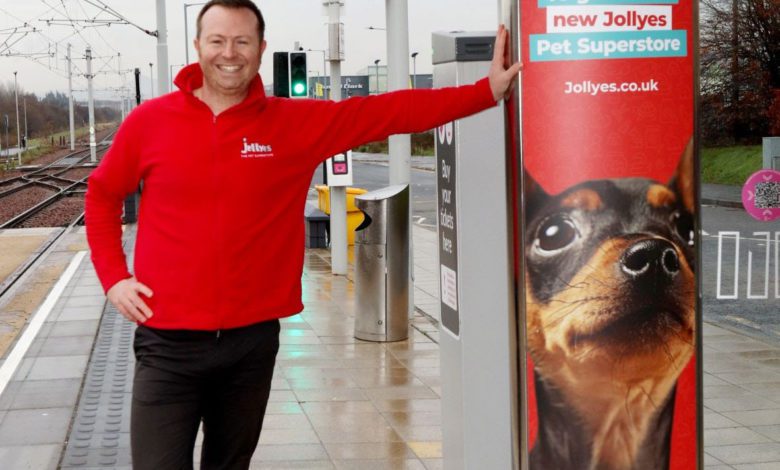How to be a CEO: The story of Joe Wykes
Pet Gazette sits down with Joe Wykes, CEO of Jollyes. Wykes discusses his journey to becoming CEO, what it’s like being CEO and advice for those aspiring to become CEO’s

Joe Wykes has been CEO of Jollyes for almost two years now. He started by qualifying as an accountant in 2006 and made his way to Jollyes with roles at Bensons for Beds and Harvey’s, with a stop in Paris along the way.
Despite his finance background, he worked in private equity from 2007 to 2017, he was always a people-focused person. Crunching numbers was never likely to satisfy him.
“After a few years of doing the financial controlling role, I always found it very interesting to understand the operational flows that came from finance. So whether that be why does the commercial team set the retail prices at this? Why does the buying team buy this? How does a lorry take merchandise from point A to point B?” Wykes says.
“I started to kind of join up the dots with finance being a good solid backbone of the business, but actually what are all the other bits that come off that backbone? I always found interpersonal relationships and businesses very interesting, understanding what makes people tick.”
As we continue our chat over zoom it becomes clear that for Wykes, building success at a company is all about building the team around him.
Wykes explains that he made prospective members of his executive team take psychological profile tests to make sure he had the right combination of risk-takers and risk-averse people around him.
“I am an inherent risk-taker, that’s what my psychological profile tells me. On my executive team, my chief customer officer is also an inherent risk-taker. My COO is relatively cautious, but not averse to risks and therefore, I hired my CFO, who is very averse to risk, very cautious and very prudent. So he is the counterbalance to the rest of the exec team. I am an inherent risk-taker, calculated, but a risk-taker nonetheless, and I’ve tried to counter that with my hires around me.”
What becomes evident when speaking to Wykes is his focus on seeking counsel. He mentions many times throughout the interview that a large part of his role is seeking counsel from those around him, whether that be his boss Richard Cotter or managers at the various Jollyes stores around the country.
“My boss Richard looks after American Golf, New Look, Silent Night and he looks after us [Jollyes], very different retailers but all in the retail space with a combined store estate of over 500 stores. So I seek Richard’s advice. What’s our pricing look like? Why are our customers doing this? Seeking his advice is hugely beneficial to me.” he says.
“I’m not a pet owner yet so I seek advice from my fellow exec members, who are pet owners on why they think this product isn’t working? Why do they think it’s working? Seeking counsel from our store managers and our regional managers who are also pet owners is hugely beneficial to me.”
Wykes reveals that on an average day he visits three Jollyes stores and spends anywhere between 45 minutes to an hour in each. He says he always tries to come away with something different that each store can do to improve, whether that be chasing up the property team over CCTV cameras that aren’t working or chasing up the buying team because some of the shelves are empty.
Being a predominantly bricks and mortar store it’s very important to Wykes that he understands what goes on in his stores.
“96% of our transactions happen in our stores, that is physical bricks and mortar transactions. So for me to understand what our customers see, what our pricing strategy is, and what the availability of stock on the shelves is, is the engine of our businesses in our stores. So I could look on our website and I could learn a little bit but actually, if I want to understand what makes our customers tick, it’s very important for me to get into our stores because physically that’s where they [the customers] are,” Wykes says.
The conversation turns to what it takes to be a CEO. He again touches on having a good team around you and how important that is to success, but he also talks about emotional control, not getting too high with success and too low with failure.
“Maintaining a very flat level of emotional discipline, so that your team knows what to expect. Trying to foster a culture of no surprises and openness I think is really important. I think having a great team around you, and trying to remain disciplined, calm and level headed, and not make rash decisions go hand in hand,” Wykes states.
He explains that it takes a lot more than just hard work to be a successful CEO. While that is a large part of the role it takes someone willing to listen to those around them, as well as being able to make the big decision.
“I think it takes someone who is prepared to listen a lot, understand the risks associated with a decision, and someone who’s prepared to trust what’s around them, I think, if you have those attributes, and you’re someone who can understand the risks and opportunities and can communicate clearly around those and then take decisions based on the information is there in front of them? I think that’s as important as working hard.”
Wykes believes that the best piece of advice for any aspiring CEO is “hire people who are better than you and take time to hire, don’t hire fast. Take your time and see it as an investment in the future, acknowledging that you can’t be the cleverest person in the room”.













